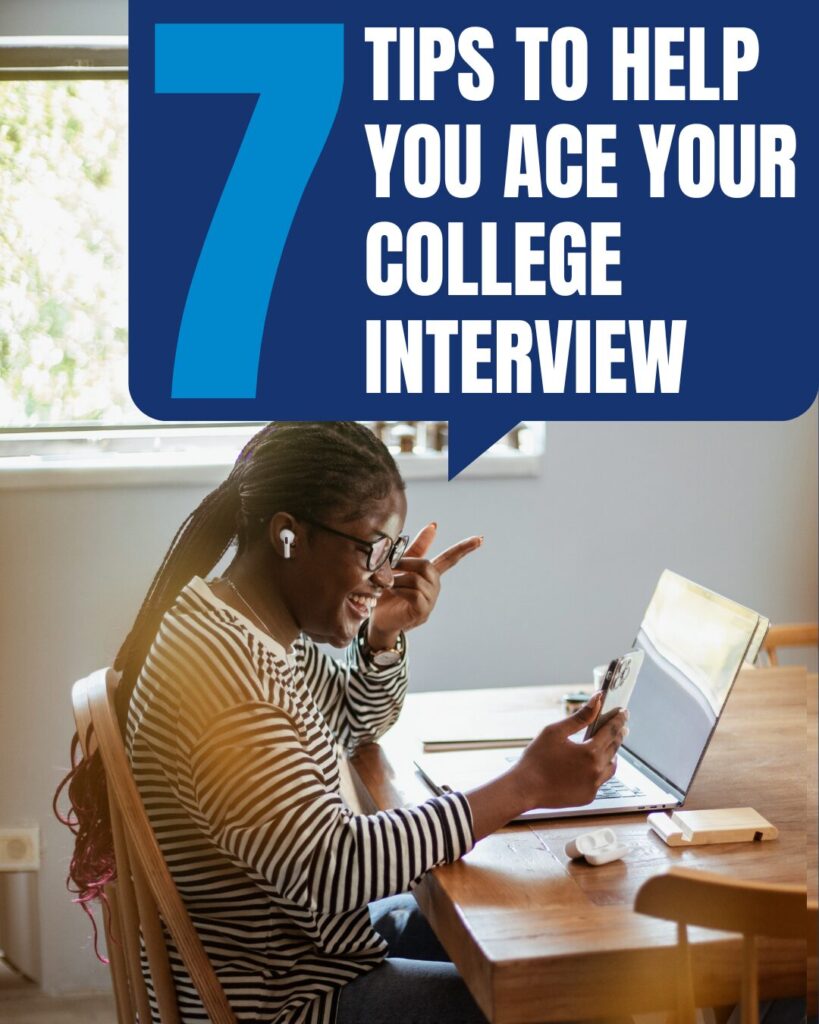Preparing your best college application and applying to colleges is a multifaceted process. The hard work you demonstrated throughout high school culminates in carefully crafted essays and activity lists–a few components of your overall application that are essential for sharing your narrative. Once you finally submit your application, you may find that a specific college offers the opportunity to complete an interview. An interview with a college can be a great addition to your overall application as it allows you to share about yourself, your interests and goals, and your reasons for wanting to attend that university in a more personal manner.

If you’ve never done an interview before, don’t worry! I’ve provided seven tips that will help you feel prepared going into it so that you can put your best foot forward.
Familiarize Yourself with Each College’s Interview Process
Not all colleges offer admissions interviews. For those that do, you can expect interview processes to vary across institutions. Thus, it’s important to review any guidelines so that you are aware of any requirements or actions you may need to take to interview. Some colleges (usually ones with smaller applicant pools) will offer interviews to all applicants. Others will only offer interviews on an invitation-only basis. At some colleges, you may need to formally request an interview on your application to be matched with an available interviewer. Make sure to check any deadlines regarding requesting interviews, as many colleges often have earlier deadlines for this purpose.
If you’re uncertain about where to find interview-related information, check the college’s admissions website first, as it’s often mentioned when discussing the application process. You can also review college-specific information on the Common Application. Once you add the college to your list, you’ll see a list of required and optional materials, including an interview if offered. Finally, get in touch with the college’s admissions office or your admissions counselor to ask about their interview process.

Get to Know Your Interviewer
Colleges may employ current students, alumni, and, rarely, actual admissions officers to conduct your interview. Whoever is conducting your interview will be tasked with providing an evaluation that will be added to your overall application. Since much of the application process is faceless and based on what the applicant details on paper in their materials, an interview can be a great way to show your personality and personalize the process a bit more.
Once you are paired with your interviewer, the college will typically provide your contact information to them so that they can get in touch with you. Usually, they will also provide the applicant with basic information about the interviewer, such as their name, email address, graduation year (for alumni), and college major. You can take some time before your interview to do an internet search of your interviewer to better understand their background and professional experiences. Take this information into consideration during your interview so that you can have an engaged conversation!
Practice Your “Elevator Pitch”
With interviews often lasting between 30 minutes to an hour, it is vital to use your time effectively and share unique or important aspects of yourself and your application with your interviewer. As you prepare, practice your “elevator pitch”. An elevator pitch is a brief summary of who you are that succinctly provides a big-picture overview of your background and interests. Oftentimes, interviewers will initiate the interview by asking, “Tell me about yourself.” As the interviewee, prepare to offer some highlights about yourself that will inform your interviewer while also providing them with a few talking points during the conversation. I recommend writing an outline or script for yourself; practice speaking it out loud so that it feels natural and easy during the actual interview. You don’t have to memorize your responses verbatim but practice enough so that you remember your talking points.
Here are a few questions to consider when preparing your “elevator pitch”:
- What are the main aspects (qualities, traits, values, experiences, etc.) that are most important to get across in my interview?
- How would I describe myself?
- What have I done?
- What am I passionate about?
Prepare and Practice
While it’s impossible to predict the exact questions your interviewer will ask, you can still practice responding to some common interview questions that may be asked. Outline or write out your expected responses first, then practice talking about it until it feels more natural. You might even ask a friend, teacher, parent, or college consultant to conduct a mock interview with you to increase your confidence leading up to your interview.
Below are a few common interview questions you may be asked. As you prepare, compose thoughtful responses and integrate specific details and examples to support your answer.
- Tell me about yourself
- What attracted you to this college, and why did you apply?
- What are you interested in studying and why?
- How would attending this college support your academic and career aspirations?
- Describe your most intellectually engaging experience. What did you do and learn?
- How do you see yourself getting involved on campus?
Be an Active Listener and Engaged Conversationalist
While it is the interviewer’s role to ask you questions, you should plan to add more to the conversation than just responding. This will mean that your initial responses will be detailed and descriptive, allowing the interviewer to potentially ask you follow-up questions. Additionally, listen attentively and look for opportunities to ask your interviewer questions so that you’re able to develop a more natural, back-and-forth cadence.
While the interviewer will likely note specific things you say that are memorable, they also want to see how you communicate and interact with others. They gauge your level of excitement or interest in communicating with them, and ultimately, they want to leave the interview feeling like they have successfully connected with you. A positive excerpt from an interviewer’s evaluation might say something like this:
He was very attentive, good-humored, and engaged throughout the conversation while also asking thoughtful questions of me. We had a good rapport and a lively chat about the college and my undergraduate experience.
Show Fit for the College
Admissions officers want to know whether you are a good fit for a specific institution. As such, you should research the college in advance, making sure to note unique attributes about the college, such as its academic offerings and its student life. When demonstrating your fit for the college, don’t rely just on the typical monikers or attributes that are obvious about a given college, as doing so fails to show your deep interest in the school.
For example, an applicant might describe her interest in attending a college because it’s one of the best schools for STEM; however, this detail is something you could easily find on a school’s website or with a quick Google search. Instead, dig deeper. Review college webpages to better understand their approach to education, and look through the course catalog for your intended major to note specific courses or faculty members you are excited to engage with. Similarly, review news articles and/or publications about the college or read blogs written by current students that may be produced by the admissions office.
In your application, you likely described reasons for being interested in a specific institution. Use these as starting points, but plan to investigate further reasons that support your genuine interest in demonstrating fit!
Be Professional
From your first interaction with your interviewer to the actual interview day, remember to remain professional in all situations. The interviewer is a representative of the college you applied to so you should strive to be polite, friendly, and punctual to make a good impression from the start.
When scheduling your interview time, respond to emails and inquiries promptly, making sure your responses have been proofread.
When meeting your interviewer in-person (or virtually), make a positive first impression by doing the following:
- Greeting your interviewer with confidence and a smile, perhaps even a firm handshake if you’re meeting them in person.
- Dressing appropriately for the occasion. Business casual attire is recommended.
- Removing distracting elements in the background if you are interviewing remotely. A neutral, solid color background or a tasteful Zoom background is best. Make sure to have good lighting for virtual calls.
- Showing positive body language such as making eye contact, nodding, smiling, etc.
Finally, be sure to send your interviewer a thank you note after your interview. This can be an email or a handwritten note. Mention one aspect of the conversation that you particularly enjoyed in your note to personalize your message and demonstrate your appreciation.
Completing an interview might sound daunting, but if you follow the tips provided above, you’ll feel more confident, prepared, and well on your way to acing your college interview! If you would like help with preparing for college interviews or with your college admissions journey, get in touch!

Admissions Evaluator at Vanderbilt Office of Undergraduate Admissions
Associate Director of Admissions and Recruitment at Vanderbilt Law School
4 Years in Vanderbilt Admissions
6,000+ Applications Read and Evaluated
Grace Chee is an Admissions Consultant with Solomon. She holds a Bachelor's Degree from Vanderbilt University in Human and Organizational Development and English, and a Master's in Education in Higher Education Administration from the same institution.



